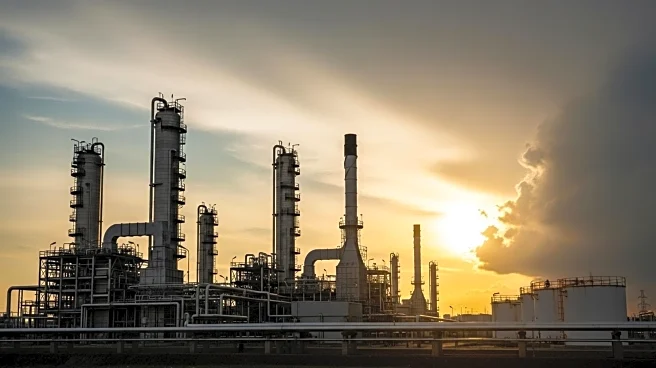What's Happening?
The United States has imposed sanctions on Serbia's main oil supplier, Petroleum Industry of Serbia (NIS), which is majority-owned by Russia's state oil monopoly Gazprom Neft. This action is part of broader sanctions against Russia's oil sector, initially placed by the U.S. Treasury's Office of Foreign Assets Control. The sanctions could significantly impact Serbia, which relies heavily on Russian gas and oil supplies, especially as winter approaches. Serbian President Aleksandar Vucic has expressed concern over the 'extremely dire consequences' these sanctions could have on the country, affecting every citizen. Despite the sanctions, Serbia plans to continue discussions with both American and Russian officials to mitigate the impact.
Why It's Important?
The sanctions on Serbia's oil supplier highlight the geopolitical tensions between the United States and Russia, with Serbia caught in the crossfire. Serbia's energy security is at risk, potentially leading to gasoline and heating oil shortages. This situation could exacerbate existing domestic pressures on President Vucic, who is already facing anti-government protests. The sanctions also underscore the broader implications of international politics on local economies, particularly in countries like Serbia that are dependent on foreign energy supplies. The move could influence Serbia's foreign policy, especially its stance on EU membership and relations with Russia.
What's Next?
Serbia will likely intensify diplomatic efforts to negotiate with the U.S. and Russia to find a resolution. The government may seek alternative energy sources or partners to ensure energy security. The situation could lead to increased domestic unrest if energy shortages occur, putting further pressure on President Vucic's administration. Additionally, Serbia's refusal to join Western sanctions against Russia may be reconsidered as the country navigates its geopolitical position and energy needs.
Beyond the Headlines
The sanctions could have long-term implications for Serbia's energy infrastructure and its political alignment. As Serbia seeks EU membership, its relationship with Russia and the West will be crucial. The situation also raises ethical questions about the impact of international sanctions on civilian populations, as ordinary Serbians may face hardships due to geopolitical conflicts. The sanctions may prompt Serbia to accelerate its energy diversification efforts, potentially leading to increased investment in renewable energy sources.










